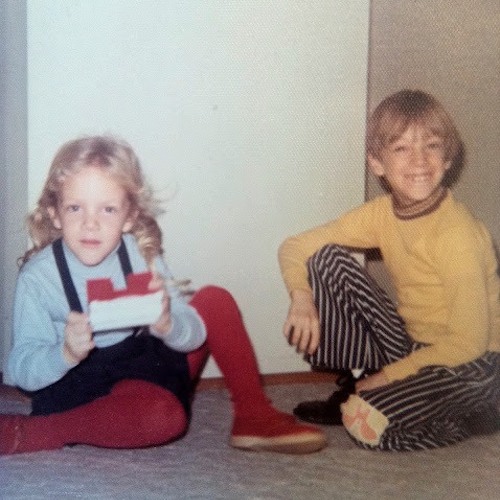
I am currently at work on a book based on Ingeborg Bachmann’s quote (from her novel, The Thirtieth Year), “Keine neue Welt ohne Neue Sprache” (no new world without a new language). So far, I’ve examined the work of Clarice Lispector, Hanne Darboven, Marguerite Duras, and, of course, Ingeborg Bachmann. The book is my final project, my master’s thesis, as an MFA student in the SVA Art Criticism & Writing program. In this book I am examining the ways these female authors refuse the language of their culture (authoritative, hierarchical) and attempt, instead, to create an alternative language--because it isn't just a refusal of power, it is a refusal of the language of power: the two are intrinsically connected.
The topics of silence and language are not new to me: they have been haunting me since I was a small child. Or, rather, since I began the assimilation or socialization process as an American child. My father is Mexican-American. Spanish was his first language and was spoken at home. He was a field worker and as a result, was never afforded the luxury of a formal education. Each time he returned to the classroom, he was pulled out, again, to work in the fields. He escaped this life by running away from home at the age of fifteen and joining the U.S. Air Force. The military became his new family (where his identity and language was changed).
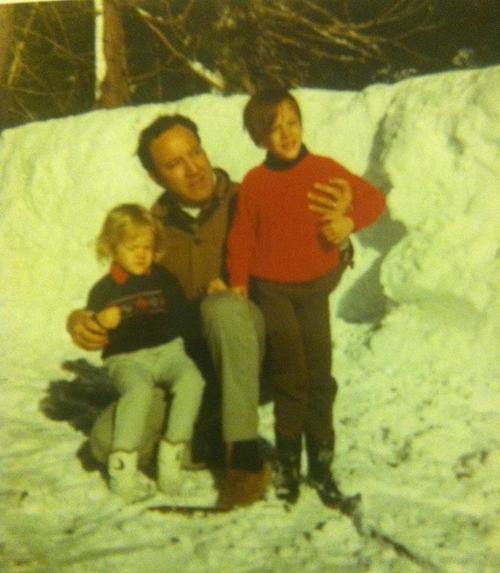
My mother is German. Or, I should say, German-Jewish Ukranian. her father, we learned not long ago, was from the Ukraine and Jewish but changed his name from Demski to Demberg: “Dem” to preserve his original name, "Demski," and “berg” to preserve the name of the city he came from, "Lemberg," which was later changed to Lviv. This, the changing of one's name as one "becomes" someone new (attempts to assimilate/conform to one's new culture) is fascinating to me and has become something of a recurring theme in the scholarship I have been doing: Marguerite Duras and Clarice Lispector both either changed their names or had their names changed and both came from extreme poverty and lack--they were transformed, transformed themselves, into secondary selves who then became authors. I never changed my name; (and my name was never changed for me)--dragging Cruz, my given name, with me throughout my life--not for writing and not for my marriage. It remains, like a scar or star, above me at all times, reminding me just where I come from. Our names name us, they direct us to who we will be—but what happens when we change our names? (I'll talk more about this later when I discuss the works of Duras and Lispector). But, also, how can we change our worlds by changing the way we speak or, rather, how, if we are foreigners or outsiders, strangers to the dominant culture let's say, can our refusing to change our speech patterns, our grammar and syntax perhaps begin to change our worlds?
My mother met my father in Germany when she was seventeen and a dancer. By the time she was twenty-one she was living in the California suburbs raising three small children (my father, returned from the military, worked 12-13 hour days trying to keep the family afloat).
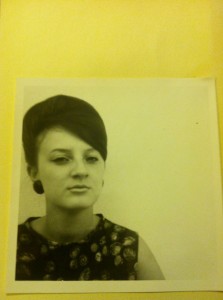
I attended German pre-school and remember the bright colors of the crayons we used to color in outlines of animals and objects we would then identify with the German words: “Hund,” “Mädchen, “Pferd,” “Kekse.”
I have no memory of social interactions (speaking). I recall only scribbling in the outlines of the drawings with crayons, munching on cookies, and taking naps (action as language—something I'll get to in a later blog).
I was born in Germany and lived there with my grandparents with my brother, while my parents searched for a home for us in California. German was my first language from babyhood.
When I attended kindergarten, I was mute. Or, I should say, I rarely spoke. Instead, I sat on the rug on the classroom floor and read from third grade readers while my classmates played outside during recess. When I wasn't reading, I was coloring the rugs with crayons. I don't recall my teachers being upset with me about these transgressions. But when I was in the first grade, my teacher screamed at me—frustrated, apparently, with my silence. Soon after, I was sent to the school’s speech therapist who took us, a small flock of children, on long walks through the suburban neighborhood. We walked along the Eucalyptus lined streets, the speech therapist, doling out M & M candies.
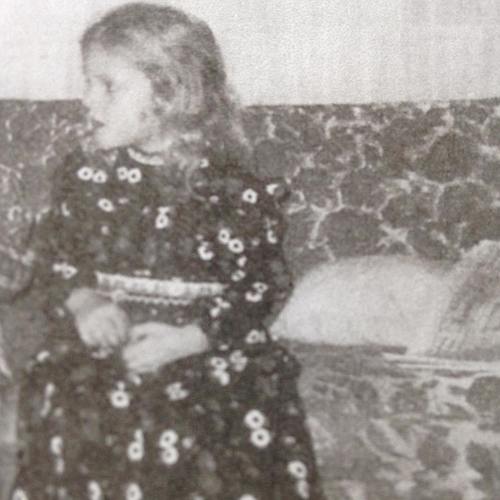
No one ever explained to myself or my parents why I needed a speech therapist. If it were simply a case of my not speaking, I wonder: would or could a speech therapist have helped me? My sister was also thrown into the tiny group of children, and she is not and has never been a shy child. What was she doing with us? What I imagine is that we spoke "funny," with idiosyncrasies, the result of growing up in a household of immigrants whose first language was not English. The word idiosyncrasy is, itself, and odd word, which derives from the Greek, idiosynkrasia, meaning "an odd temperament." It is true that I seemed odd and perhaps the idea was that this tiny group, being a part of this small group, led by this speech therapist might somehow help to “finish me," (clean me up around the edges), my tiny finished school.
Silence is often the result of shock. When someone says something to me I find disturbing, I am often made mute: I look dumb. Stumm, the German word for mute or silent, sounds also like dumm, the German word for dumb. But the word sounds also like what happens to us when we are struck dumb: stumm, dumm, dumb. In an article I read in The Los Angeles Times about the children who've traveled from their homes in South and Central America up to the US border, the children, and especially the girls who've been raped, appear at the border disoriented, suffering from memory lapses.
This state of fragmentation, of broken-ness, is an enactment of her experience. She has been broken, fragmented, confused. People have tried to erase her. When she is able, with the assistance of others, she will be able to tell her story which will be told, presumably, in her fragmented voice; a story non-linear, with stutters, hesitations, and plenty holes.
As Elaine Scarry writes in The Body in Pain, "It is commonplace that at the moment when a dentist’s drill hits and holds and exposed nerve, a person sees stars. What is meant by 'seeing stars' is that the contents of consciousness are, during those moments, obliterated, that the name of one’s child, the memories of a friend’s face, are all absent(30)."
When we are in physical or psychic pain, we lose consciousness, we lose connection to our selves and to our worlds, and we forget everything. This is what torture does. And when the victim regains herself and her world, it will, most likely, reappear only in fragments. My memory of being raped when I was eleven years old is a collection of mere fragments. What my mind cannot recall it cannot because if it did, if my mind were to bring back every moment of those two weeks when I was nearly killed, it would be too much. (Thank God for the mind).
In Jean-Pierre Gorin’s film, Poto and Cabengo, based on the lives of two young twins, Grace and Virginia, who create their own language, one no one else can comprehend, the two are considered, by a doctor who their parents take them to, to be developmentally challenged and, as a result, are kept home from school.
Its importance to note: the two girls changed their given names from Grace and Virginia to Poto and Cabengo (altering their identities, creating their own worlds). Then, they invented their own private language.
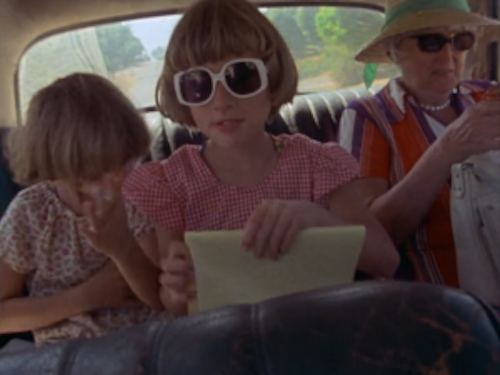
When the two were finally sent to a speech therapist, it was determined that, far from being slow, the two had actually invented their own language. Having been isolated at home with their grandmother who spoke only German to them, it was inferred that their private language may have resulted from their mimicking of this language as well as a desire to form a separate language, a separate world.
I don’t remember what, if anything, I learned from the speech therapist at Capitola Elementary School. My dad still worked long days and my mom still spoke to us in German and in the English she had been taught in school which, as it turns out, was a British-English. I was considered odd in the public schools I attended but somehow made my way: sitting in the back row of the classroom, reading books during my free time, making my own world. I spent summers and winters in Germany and existed as a kind of fragment between two cultures and languages.
The summer before I began high school I made the decision to begin to use contractions: can't, won't, don't and so on which tells me, even this late, I was still speaking a kind of British English. And I decided, too, to begin to speak more like my classmates using words like "like," and embracing the California inflected vocabulary I was surrounded by. In high school no one made fun of the way I spoke, in fact, by high school, I'd pretty much made myself vanish completely: a "wall flower," as Mr. Bjur, my high school history teacher, termed me, using me as a real life example of the word when he attempted to illustrate it in class one afternoon.
My coming to poetry, years later, began my return back to the original self and my original language of that self: the scaffolding I tried my entire life to obliterate. The stutter, the hesitation, the murmur, the embrace of another world--these are what I was when I began and the syntax and grammar of what I was made of. And this is the subject I will explore for the month of April, the subject of language and silence and its various iterations.
Cynthia Cruz is a poet, novelist, and nonfiction writer. She is the author of the poetry collections…
Read Full Biography

